Virtual Reality Lab
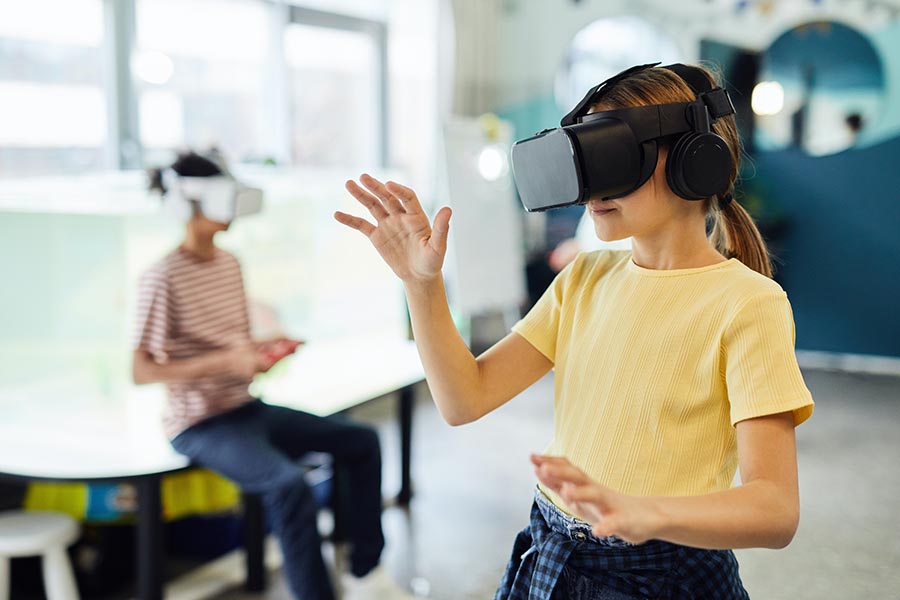
We focus on creating immersive, personalized tools that allow users to practice and acquire skills using virtual reality in a controlled and engaging manner.
Our laboratory aims to enhance the lives of individuals with intellectual and developmental disabilities through the development of custom virtual reality technologies. Our goal is to provide adaptable solutions that can be used at home or in educational settings, facilitating skill development in ways that are otherwise unsafe or impractical. By tailoring these technologies to individual needs and adjusting the difficulty based on performance or comfort level, we strive to improve both the accessibility and effectiveness of skill learning for people with intellectual and developmental disabilities.
The Virtual Reality Lab is located within UNMC's Munroe-Meyer Institute Department of Physical Therapy.
Approach
Our approach begins with the development of virtual reality software, which we then refine and adapt to address specific research questions. We utilize the Meta Quest platform for our physical therapy games, ensuring accessibility through a cost-effective, commercial device. Our daily living activity simulators incorporate physiological data recording to monitor stress levels and employ an advanced omnidirectional treadmill, allowing users to explore virtual environments beyond the confines of the laboratory. Additionally, we design custom technologies tailored to collaborative needs, such as creating and implementing a usage tracking board for adaptive mobility devices. Our engineering expertise enables us to tailor our methodologies to the precise requirements of each research inquiry.
Our Team
Our team comprises research and development engineers who collaborate closely with clinical researchers, as well as graduate, undergraduate, and high school students. We provide a supportive environment where individuals interested in addressing complex questions with custom technologies can engage in design discussions and actively participate in the development process.
We believe that the most innovative solutions emerge from interdisciplinary collaboration, where diverse expertise converges. Our approach fosters an environment where clinical research and technical skills are integrated to explore new possibilities.
In our laboratory, we offer training opportunities for those with clinical research and technology backgrounds. For those with clinical research backgrounds, we focus on leveraging technology for skill training and addressing data collection and analysis needs. For individuals with technical expertise, we guide them in applying their skills to answer compelling research questions and conduct clinically relevant research using advanced technologies.
Current Grants
Title |
Grant Type |
|---|---|
| Neurobiological mechanisms of sensory hyper-sensitivity and habituation in autism spectrum disorders | Cognitive Neuroscience of Development and Aging Center Pilot Grant |
| Neurobiological mechanisms of sensory hyper-sensitivity and habituation in autism spectrum disorders | IDeA-CTR Early Career Investigator Program |
| Enhancing Upper Extremity Rehabilitation in Neurodiverse Children: BCI-Mediated Neurofeedback and Virtual Reality for Improved Engagement and Training Quality | University of Nebraska Collaboration Initiative |
| Modified ride-on cars usage and impact on global development in children with mobility delays | Child Health Research Institute Pilot Grant |
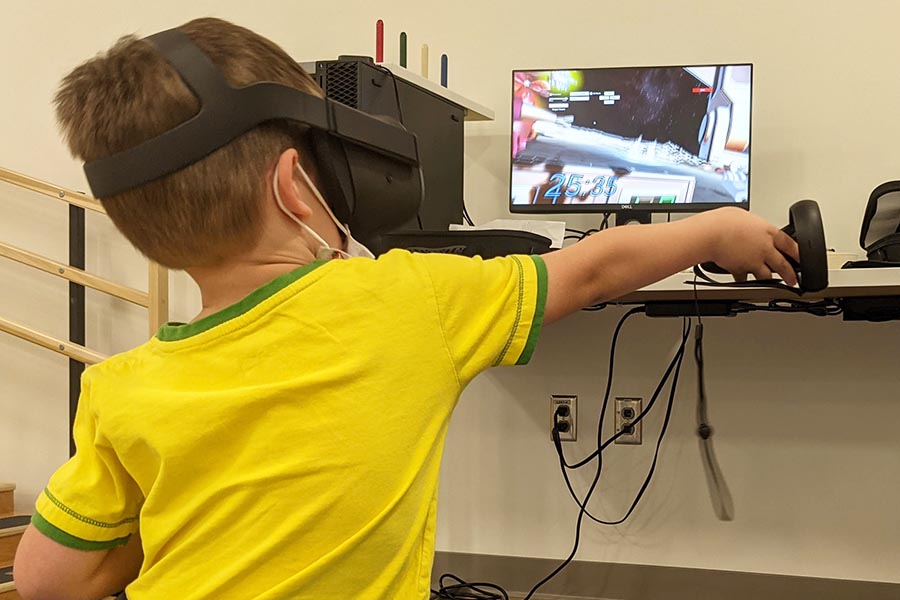
HABIT-VR participant uses one controller to play a therapeutic video game.
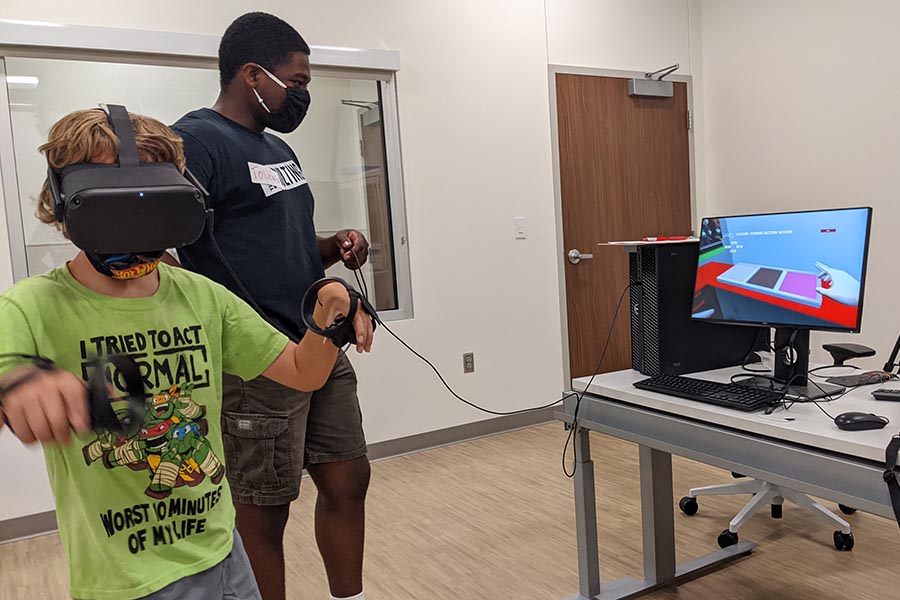
HABIT-VR participant uses two controllers to reach while playing a therapeutic video game.
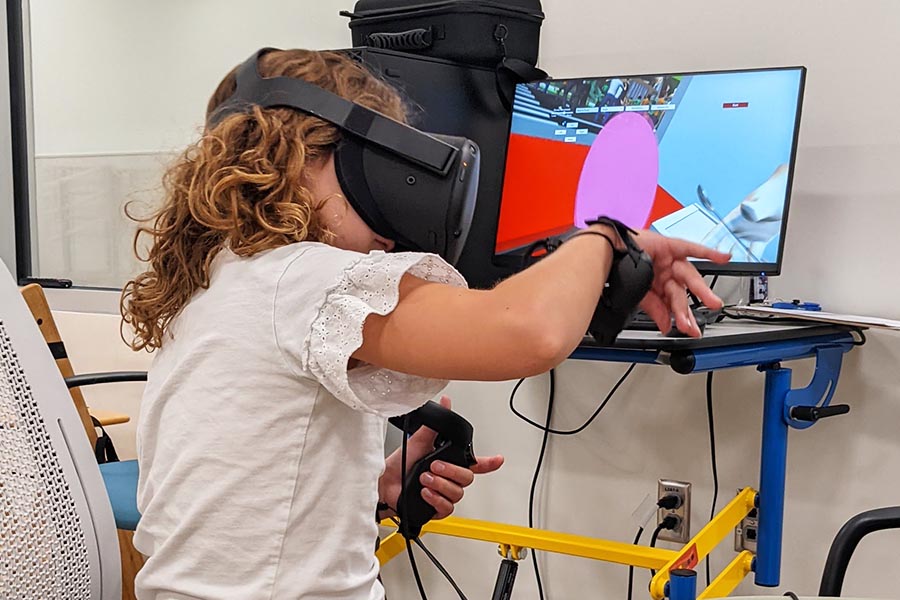
HABIT-VR participant uses two controllers to scoop while playing a therapeutic video game.
Projects
Hand Arm Bimanual Intensive Training in Virtual Reality (HABIT-VR)
HABIT-VR takes the proven therapy technique of HABIT and turns it in therapeutic video games! Our interdisciplinary team of engineers, occupational therapists and physical therapists work together to build these games at MMI and ensure that the games have everything they need to improve upper-extremity function while still being fun.
Activity of Daily Living Simulators
Some skills can be difficult or unsafe to practice in the real world. In the Virtual Reality Laboratory, we create realistic virtual environments that allow people to safely practice these skills at their own comfort level. Our team partners with clinicians and researchers from the integrated Center for Autism Spectrum Disorder (iCASD) and has developed simulators to practice receiving a haircut or practice crossing the street, using our state of the art equipment.
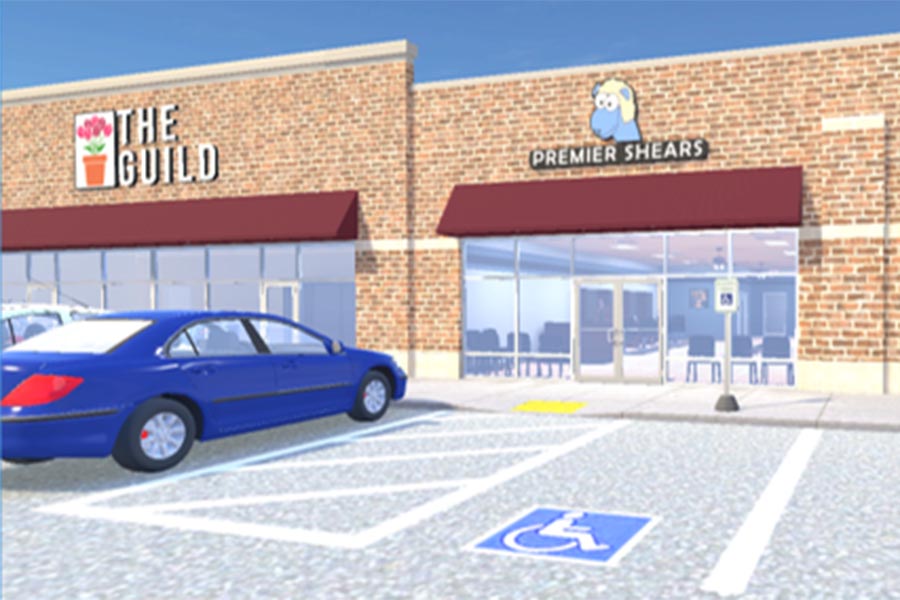
External view of VR hair salon for participants to safely practice skills.
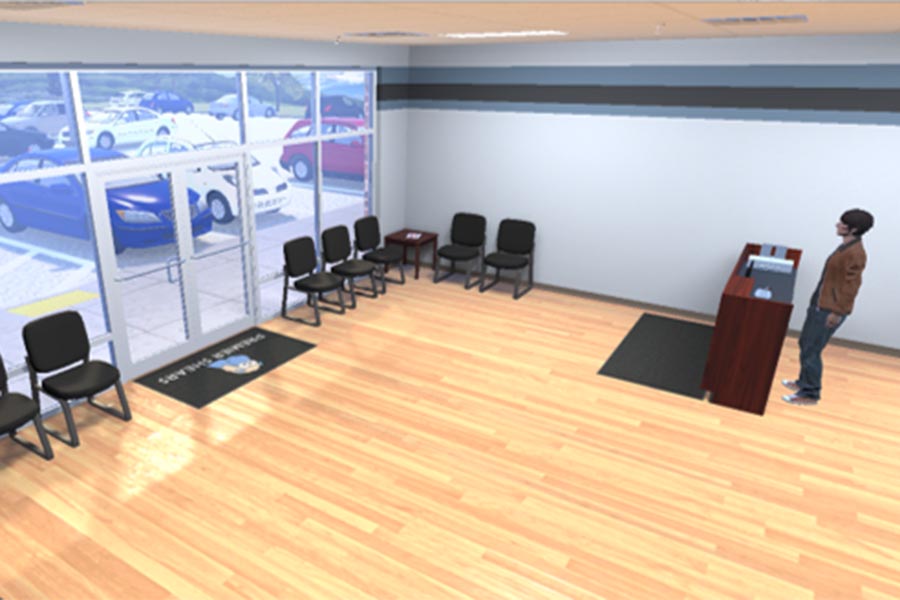
Internal view of VR hair salon waiting room.
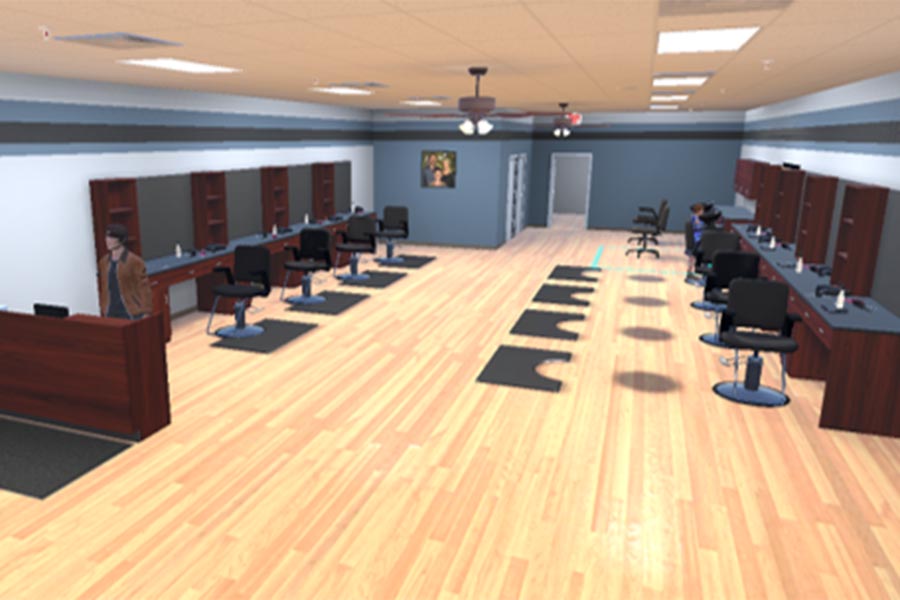
Internal view of VR hair salon booths.
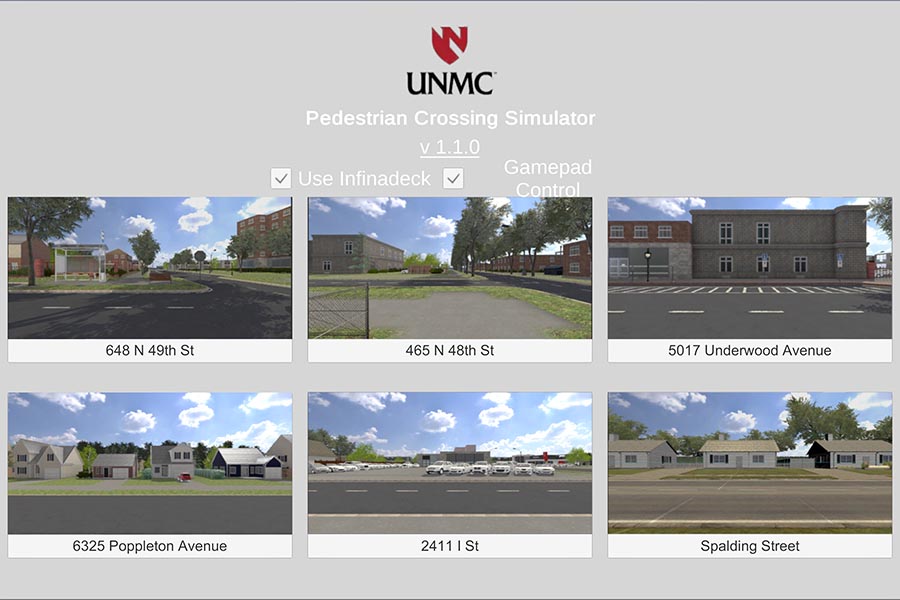
Computer screenshot showing six street intersection choices to practice pedestrian crossing.
Faculty, Staff and Student Research
Explore research publications focused on many aspects of disability performed by faculty, staff and students in the department of physical therapy's Virtual Reality Laboratory at MMI.
- Ryan Thomas, BS
In the News
HABIT-VR
- UNMC's Munroe-Meyer Institute uses virtual reality video games to help patients
- UNMC studying how video-game therapy helps young people with cerebral palsy
- MMI camp uses VR games to achieve therapy goals
- Design team builds VR game to help children with cerebral palsy
- UNL students develop virtual reality game to help kids with cerebral palsy
Toy Adaptation
- This Teen’s Boy Scout Project Helped Other Special-Needs Children: ‘It’s a Game Changer!’
- Boy Scout creates accessible toys for children with disabilities at Munroe-Meyer Institute
- Families, therapists take home adapted toys and new skills at workshop
- MMI’s adaptive toys program keeps spreading skills
GoBabyGo
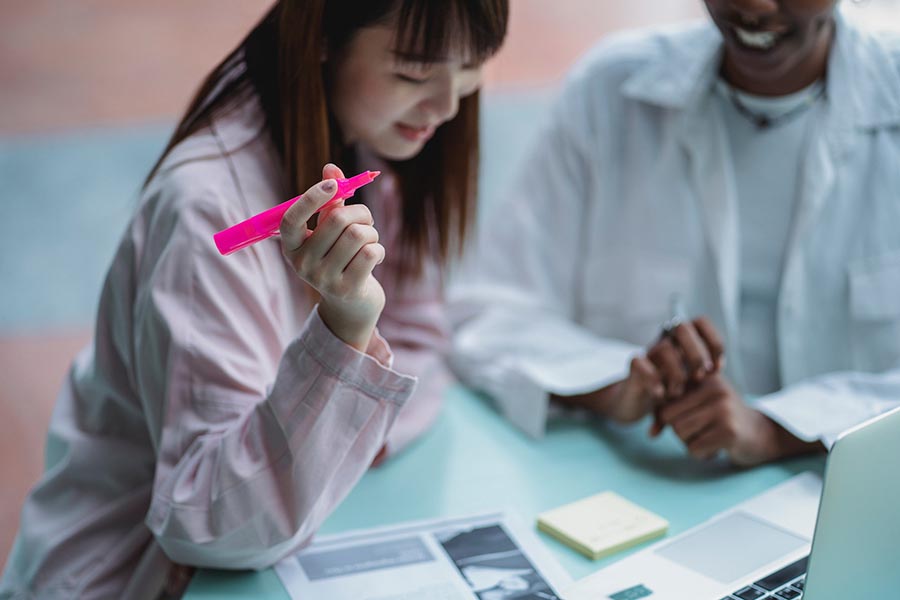
Student Opportunities
Explore opportunities at MMI for post-doctoral fellows, doctoral interns, graduate and undergrad students to assist faculty in research efforts.